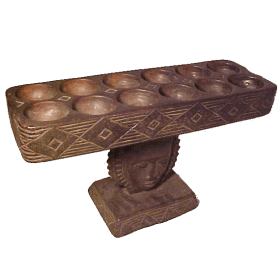Kalah
 The Kalah game is one of a family of two-player turn-based strategy board games played with small stones, beans, or seeds and rows of holes or pits in the earth, a board or other playing surface.
The Kalah game is one of a family of two-player turn-based strategy board games played with small stones, beans, or seeds and rows of holes or pits in the earth, a board or other playing surface.
The objective is usually to capture more pieces than the opponent.
Número de xogadores: 2
Duración do xogo: 5 mn
Complexidade: 1 / 5
Xoga Kalah e outros 1226 xogos en liña.
Non son necesarias descargas - xogad directamente dende o teu navegador.
Cós teus amigos e miles de xogadores do mundo enteiro.
De balde.

Xoga Kalah e outros 1226 xogos en liña.
Non son necesarias descargas - xogad directamente dende o teu navegador.
Cós teus amigos e miles de xogadores do mundo enteiro.
De balde.

Sumario de regras
EQUIPMENT
Kalah is played on a board of two rows, each consisting of six round holes that have a large store at either end called Kalah.
A player owns the six holes closest to him and the Kalah on his right side.
The board is set up with the same number of stones (or seeds) in each round hole. The Kalah is empty at the start of the game.
Beginners may want to start with three stones in each hole, but the game becomes more and more challenging by starting with 4, 5 or up to 6 stones in each hole. Traditionally the game play is most associated with 4 stones.
OBJECT
The object of the game is to have more stones in your Kalah than your opponent does. Once a player 'Captures a stone in their Kalah, it it remains there for the rest of the game. There are three ways to put stones in your Kalah:
1) A player gets stones by placing them in regular movements into their Kalah (one at a time).
2) Stones are captured by landing in your open space and your opponent has stones in the opposing hole. Stones from both holes are transfered to the Kalah.(the empty capture varient does not require the opponent to have stones in the opposing hole to claim the single stone)
3) When a player has no stones on their side of the board and it is their turn to play, the game is over and all remaining stones go Kalah on that side of the board they are on.
This BGA game will end when 50% +1 stones are in a single player's Kalah
RULES
At the beginning of the game, the selected number of stones are in each hole (3 to 6). Each hole has the same number.
Play is always counterclockwise. On a turn, the player removes all stones from the selected hole on their half of the board.
Moving counter-clockwise, the player drops one stone in each hole in turn, including the player's own Kalah but not his/her opponent's Kalah.
Under the "Pie Rule" variation, once the first player completes their initial move, the second player has the option to choose take their opponent's position.
If the last stone is dropped into an opponent's hole or a non-empty hole of the player, the move ends without anything being captured.
If the last stone falls into the player's Kalah, he must move again.
If the last stone is put into an empty hole owned by the player, he captures all stones of the opposite hole together with the capturing stone and puts them in his/her Kalah. If the opposite hole is empty, nothing is captured. A capture ends the move.
END OF THE GAME
The game ends:
When a player, at his turn, is unable to move, because his no longer has any stones in any of his holes. The remaining stones are captured by his opponent.
OR
When a player collected more half of all stones in his/her Kalah.
The player who has collected most stones in his/her Kalah is declared the winner.
VARIATIONS (OPTION OF THIS ADAPTATION OF THE GAME)
«Pie rule» - Second player can take opponent's first move and change sides of the board.
«Empty Capture» - This variant permits to capture the last stone when landing in an empty hole on the player's own side even when the opposite hole of the opponent is empty.
《Stones》 - This varient allows a game to start with 3, 4, 5 or 6 stones in each of the 12 holes.
COMMENT FROM THE DEVELOPER (stst)
THESE RULES ARE USED AT THIS ADAPTATION OF THE GAME
THE FOLLOWING ARE NOTES FROM BGA PLAYERS
This game is also known as Mankalah. There are several other variations of this game which are not in BGA such as:
- No capture
- Placing stones in both Kalah
- Self capture by placing stones in an opponent's empty hole
- No counters in the holes to indicate number on stones in them.

